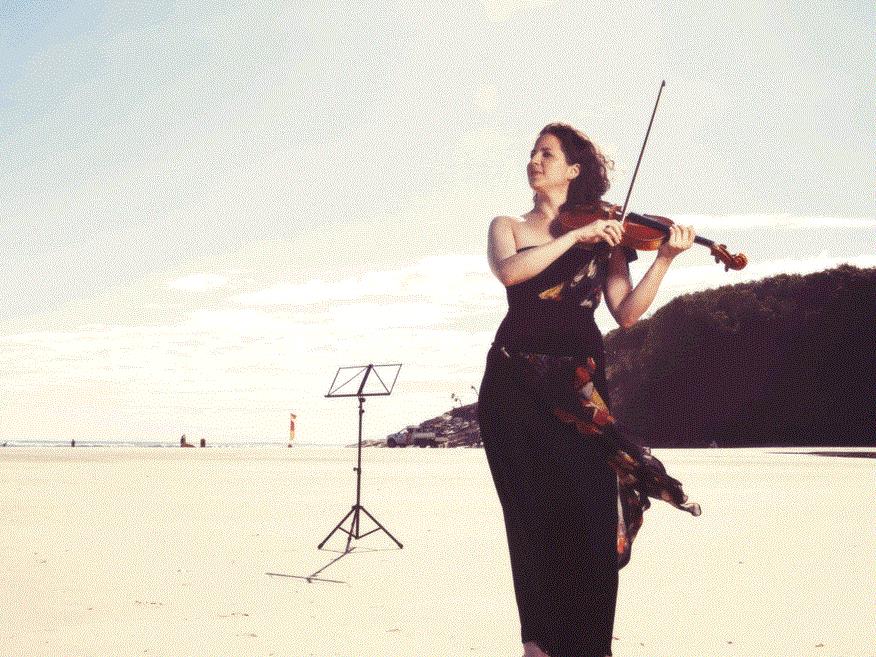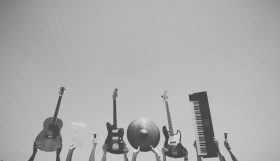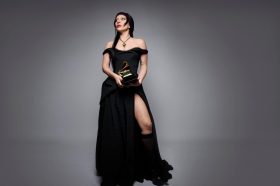Image via Stradbroke Chamber Music Festival.
Set in the glorious location of Moreton Bay, a short ferry ride from the mainland, with the annual migration of whales in the winter attracting local and international tourists. While listening to concerts in this wonderful environment, it was fascinating to watch the pods of mothers and calves making their way south from the birthing waters of Hervey Bay back to Antarctica. Dozens were plying the clear turquoise waters, the majesty of the whales harmonising beautifully with the mellow strains of the mostly classical styled music presented over three days.
Most of the programming by violinist, Rachel Smith, the inaugural Artistic Director, revolves around the traditional romantic style through twentieth-century repertoire. But she is not averse to throwing out challenges, such as a new commission or inviting guests outside the mainstream. Variety is important to festivals.The first concert entitled Jacob’s Dream dwelt on a theme of fantasy and myth. Haydn’s stately early romantic Piano Trio in E-flat minor was lovingly played by violin, cello and piano, rich, warm sounds that got the concert off to a brisk start. Janacek’s Podhádka demonstrated a wonderful cello technique, the depth of the narrative perfectly matched by the piano. Schumann’s Marchenerzahlungen was the least interesting repertory choice, a dull disjointed piece, redeemed by a relatively unknown but breath-of-fresh-air Mozart extract, a Clarinet Quintet Allegro in B-flat major joyously played by William Stafford with accomplished strings. This led to the final choice, the astounding Mythes from Szymanowski, brilliantly played with great assurance by Sophie Rowell (violin) and mirrored perfectly by Louisa Breen (piano).
Breakfast Fandango with Karin Schaupp offered some interesting elements including readings from Lorca, Spanish music by Tárrega, Albéniz and De Falla and Boccherini’s Guitar Fandango, showing off the best of the guitar in this genre with string and piano accompaniments.
Autumnal Romantics was the third concert offering, following the romantic theme with works written by composers in the latter part of life. Of these the Schubert Fantasy in F minor for piano four hands was superbly managed by Stephen Emmerson in the upper and Paul Hankinson in the lower register. Schumann’s Märchenbilder was again a less interesting choice, the composition lacking passion, though the Brahms’ Clarinet Trio in A minor was excellent. Starting with a gorgeous cello theme, quickly taken up by clarinet and then piano, the three instruments wove deftly through the four movements with some thrilling virtuosic playing creating high octane energy.
Saturday evening’s concert showcased the extraordinary talents of The Joseph Tawadros Quartet, sold out as soon as it went on sale. Joseph plays the Egyptian oud, an Arabic lute or mandolin which can sound, in his mastery of the instrument and in the cross-over music he develops, like a banjo or guitar. He elicits some amazing sounds, though always deeply embedded in a middle eastern sensibility. The quartet includes Matt McMahon on piano, Karl Dunnicliff on double bass, alongside his brother, James, a percussionist who plays the Arabic frame drum and the tiny req (Egyptian tambourine). They are each, and collectively, phenomenal musicians, able to improvise and play off each other as they develop fusion music that crosses between classical, bluegrass, folk and jazz. Never less than electrifying and always entertaining, given Joseph’s wild sense of humour and ability to laugh at many taboos, this was a sensational concert where the quartet played a diverse range of their work. All artists undertook impressive solo spots too as well as highlighting works from a recent album, Permission to Evaporate. To finish, Tawadros entertained with his own exhilirating composition, Constantinople.
The next day, in the final concert (F)east! both brothers improvised before repeating the glorious Eye of the Beholder, which they had played as a quartet the previous evening but performed this time with classical strings. Written originally for the ACO as a half Baroque (Vivaldi) half Arab piece of music, this was immensely impressive and gave the oud a completely new feel. The remainder of the sixth concert included the new Israeli/Australian composition by Yitzhak Yedid, Chad Gadya, which was anarchic in style and appeared almost impossible to play. Despite his long explanation of how it was based on a children’s Hebrew rhyme, musically the piece made no sense. This eclectic program concluded on a wonderfully uplifting note with Dvorak’s Piano Quintet no. 2 in A major, piano and strings in perfect harmony in this lush Slavic -inspired music.
Three venues are utilised for the five concerts – the first of the three was at the Point Lookout Community Hall, the Saturday evening concert at the Surf Life Saving Club with its magnificent ocean views and the final two on Sunday in the Dunwich Public Hall near the ferry landing. They are small and intimate spaces, flat floors but with good acoustics and holding no more than 200 people. Perfect for chamber music, though some proper staging and rostra might help to alleviate sight problems as all of the concerts were packed.
Smith has explored how to grow the festival, while at the same time maintaining its unique qualities, utilising the only real spaces the Island can provide and containing the program within a weekend. The charm is that the festival works pretty well as it is, thanks to the help of island sponsors and supporters and an army of volunteers. And the mild winter that coincidentally aligns with the whales’ migration is also a perfect time to attract those interstate music lovers from down south seeking warmer climes. One has a feeling that the festival will remain more or less exactly as it was originally envisioned. It is boutique, in an attractive location and offers quality music making, lovingly played by musicians to a fiercely loyal fan base, both audience and artists accepting and relishing the wonders and limitations that the island offers.
Stradbroke Chamber Music Festival
4 stars out of 5
28 to 30 July 2017





